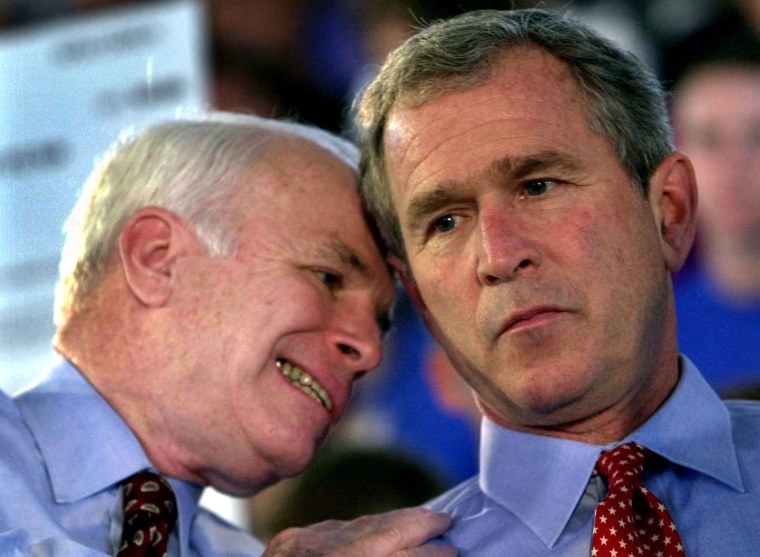Truth be told, John McCain really can't stand George W. Bush, even if he agrees with him on a lot of things, especially Iraq. It's amusing for us political reporters to watch the senator from Arizona struggle with the role fate handed him: riding shotgun on the Bush re-election stagecoach. It's hard to know whether McCain, deep down, wants to protect his passenger or let the Indians have him. As for Bush, he doesn't trust McCain, but he needs him.
McCain's rhetorical flirtation with the idea of becoming Sen. John Kerry's running mate is just the latest act in an ongoing intramural psychodrama that began in 1999, and no amount of common geostrategic purpose in the post-9/11 world can end it. He is a proud man, a fierce fighter with an ego to match the pride and ferocity. He wanted the Republican nomination in 2000, wanted it badly, and raged against what he saw as a system rigged against him.
As the season started, McCain surveyed the landscape and saw Bush as a pampered kid being set up in the family business — presidential politics — on the strength of his father's connections and access to money. McCain railed in private about this. He tried to laugh about it, but he was seething inside. McCain was from royalty, too, in his own way — Navy royalty. He was the namesake of a famous father, and that smoothed his path to Annapolis and helped keep him there. But he had paid his dues in the most profound way, with five years of his life in prison cells in Hanoi.
The deeper wound was South Carolina. Had McCain won the primary there, he might be president today. His own tactical mistakes were costly. But there was another reason for his loss. The good ol' boy supporters of the Bush team savaged McCain and his family, spreading vicious rumors about their character and racial makeup. No direct tie to the campaign has been found. But none was needed. The boys didn't have to be told what to do. They knew. They'd done it before, to others.
Letting bygones be bygones
After it was all over, Bush, with his usual steely geniality, told McCain that the rough stuff of the primary season was not his fault and, in any case, was just politics. Time for bygones to be bygones. Exactly what the senator said in reply isn't known. But Bush and Karl Rove knew that they couldn't afford to antagonize McCain further. McCain, for his part, didn't want his "maverick" reputation to rob him of the chance to be a major player in a capital dominated by his fellow Republicans.
Even had 9/11 not happened, the Bush White House would have had to tolerate McCain. He is chairman of perhaps the most powerful and certainly the busiest committee in Senate, the Commerce Committee. Virtually every big-hitting corporation with business in Washington needs to see Rove & Co., of course, but they also, quite often, need to see the senator.
Since the Twin Towers fell, Bush and McCain have been thrown into closer proximity. The president needs McCain's support and credibility as a military man; McCain needs the president to champion their shared belief that force — and only force — can teach the terrorists and their blathering U.N. apologists that America will protect itself at all costs.
McCain has been measured but evidently quite serious in his praise of the president's handling of the war on terrorism and the aftermath of 9/11 in particular. He told friends that he thought Bush had risen to those occasions impressively.
The fun of needling Bush
But McCain still finds it hard not to remind the White House of his independence, and can't resist needling Bush even when he dutifully is arguing the president's case. We were right to go to Iraq, McCain says repeatedly, but he has been increasingly tough on the administration's intelligence-gathering problems and use of intel in making its case for war. He has refused to sanction the notion that intelligence data was deliberately distorted, but insisted on the need to probe — hard — for the facts.
When Bush-Cheney ’04 launched a TV ad last week that invoked the horrors of 9/11, McCain defended the move — but added that perhaps the president's team might have chosen other pictures for the video: He said just enough to give critics some support.
And now the question of the veepship. It's true that he and Kerry are close. They are perhaps the leading members of an informal caucus of Vietnam Veterans in the Senate, a fiercely loyal group that tends to eschew party lines whenever possible to express solidarity with one another. It's also true that, like any politician, McCain likes to make news, likes to be in the limelight and likes to be asked if he has any interest in being a partner on a national ticket.
I don't think McCain is serious. He'll stay where he is, but it's not because he feels any affection for the guy he's riding with.
Howard Fineman is Newsweek’s chief political correspondent and an NBC News analyst.
